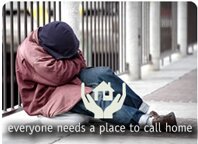The 2010 Winter Olympics are upon us. All the venues are ready,more than 25,000 volunteers have been mobilized,the world is turning to Vancouver and more than $6 billion has been spent.
It is an undeniably exciting time that will be enjoyed by many of us. Many Christians of all denominations have signed up to become Olympic volunteers or have gotten involved in the interdenominational More Than Gold campaign that encourages hospitality towards visitors as a Christian witness. Their efforts are laudable.
The fun,our national pride and our encouragement of athletic accomplishment are all wonderful things yet even during this intense time of excitement,we continue to be called to express both God’s love for the poor and vulnerable and His desire for justice. Tim Dickau,senior pastor at Grandview Calvary Baptist Church in east Vancouver,has been among the most vocal within our Canadian Baptist denomination about raising social justice concerns around the Olympics,so we would like to share some of his thoughts. Grandview Calvary is one of the churches at the forefront of efforts in Vancouver to provide immediate relief for our neighbours in need and to seek long term justice on their behalf.
“The concern we have is that the amount of spending on a 2-week event could have been better used,”says Tim. “For example,they are spending $1 billion in security alone – for a 2-week event. Think of what $1 billion could do for housing across Canada when there has been no national housing program since 1994. Secondly these kinds of spectacles may make people feel good for a short time but they don’t bring about change. We are also concerned that people are being displaced from homes so that landowners can get higher rents. We know this is happening and we are already hearing that people on the street are being told not to linger in parks even during the day. Where do they go?”
“There are some benefits coming out of the Olympics,like some of the infrastructure:the [mass transit] Canada Line,for example. Although working mostly on hospitality,More than Gold has tried to use the Olympics as a catalyst for social action as well and has had some success,”he says,citing More Than Gold’s partnerships with REED (human trafficking) and Shalom Seekers (affordable housing). These two non-profits are both associated with GCBC and have been funded in the past by the CBWC’s Opportunity Fund. More than Gold also partners with A Rocha,the Christian environmental organization.
“It shows people have the desire to do something,but I wonder whether the effort can be sustained,”questions Tim. “Why is it we are so eager to open our homes to the wealthy who can afford to come here and buy tickets when we won’t even consider opening our homes and churches to the poor who are living right next to us?”
As the fervour and excitement of the Olympics fade away,how can Canadian Baptists – in Vancouver and across Western Canada – sustain their social justice efforts?
According to Tim,we need to work at four levels:
1. Providing emergency shelter in our church buildings and opening our own homes
2. Providing longer-term community housing for those without homes or living on low incomes
3. Building social housing by converting land assets,such as church parking lots,into housing.
4. Lobbying for structural change within our municipalities,provinces and nation
At the root of these four levels of activity lies the recognition that our churches are not only places to worship our living God: they can be used to offer compassionate justice to the poor and needy. We worship and honour God when our churches become places of welcome and protection as overnight shelters and when we convert church assets into housing or other ministries to benefit the less fortunate.
At the structural level,Christians can lobby government for systemic change. For example,we can speak directly to government officials to insist on a national housing program get involved in the Raise the Rates campaign which is working to convince governments to increase monthly funds for people on welfare or with disabilities and to raise the minimum wage so that the poor and vulnerable can live in dignity.
There is much to do and no better time than now to begin: the flame of caring for the least among us can burn long after the Olympic flame has been quenched.



